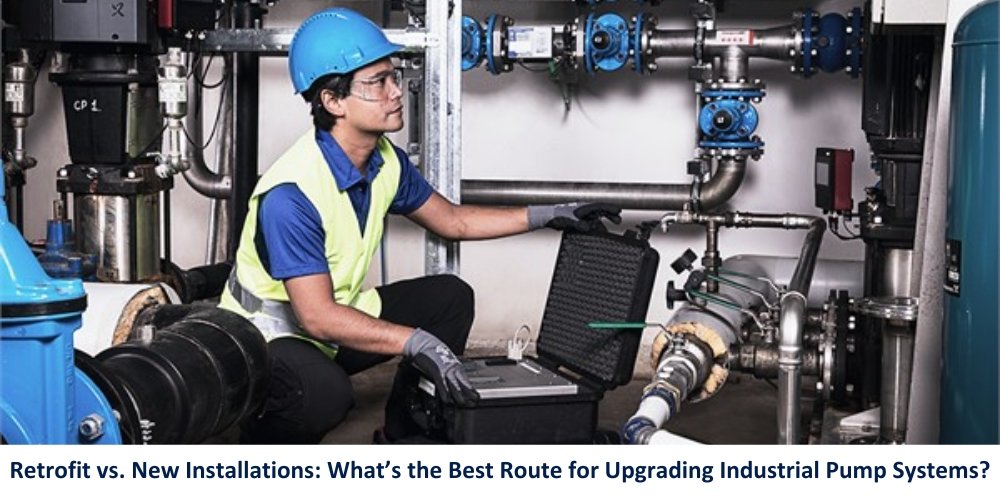Retrofit vs. New Installations: What’s the Best Route for Upgrading Industrial Pump Systems?
Your industrial pump system is the heart of your operation. Whether it’s for boiler feed, cooling towers, or wastewater management, a failure can mean costly downtime. When performance drops or efficiency wanes, you face a critical question: should you retrofit the existing system or invest in a completely new installation?
For industries in Pune, this decision impacts your bottom line, productivity, and sustainability goals. As trusted water pump dealers in Pune, Qpoint Engineering Solutions is here to guide you through this complex choice.
Understanding Your Options
First, let’s define the two paths.
A retrofit involves upgrading specific components of your current pump system. Think of it as a heart transplant rather than a whole new body. This could mean replacing an old motor with a high-efficiency one, adding a Variable Frequency Drive (VFD), or updating the control panel.
A new installation is a complete replacement. It involves removing the old pump and piping and installing a brand-new, state-of-the-art system designed for today’s demands.
The Case for Retrofitting: Smart Upgrades
Retrofitting is often the first option that comes to mind. It’s seen as a quicker, less invasive, and more cost-effective solution.
Pros of Retrofitting:
- Lower Initial Cost:The upfront investment is typically significantly lower than a full replacement. You’re only paying for new parts and labour, not entirely new equipment.
- Minimized Downtime:Retrofitting is usually faster. This means your production line is back up and running quickly, minimizing lost revenue.
- Preserves Existing Infrastructure:If your base pump and piping are in good condition, a retrofit leverages that solid foundation.
- Immediate Efficiency Gains:Adding a VFD or a high-efficiency motor can drastically reduce your energy consumption, offering a fast return on investment.
Cons of Retrofitting:
- Limited by Existing Design:You are confined by the limitations of your original system’s design, which may not be optimal for current needs.
- Potential for Future Issues:Older components, not replaced in the retrofit, could fail later, leading to more industrial water pump repairs and services in Pune near me.
- May Not Be a Long-Term Fix:It can be a “band-aid” solution if the core system is too old or degraded.
Retrofitting is ideal when your system is relatively young, the foundation is sound, and you need a specific performance boost, like energy savings.
The Case for New Installations: A Fresh Start
A new installation is a comprehensive solution. It’s a chance to completely reimagine your pumping process with modern technology.
Pros of a New Installation:
- Peak Efficiency and Performance:New systems, especially premium brands like Grundfos, are designed for maximum energy efficiency and reliability, slashing operational costs.
- Latest Technology:You gain access to smart controls, IoT connectivity, and advanced materials that improve longevity and provide valuable operational data.
- Reduced Long-Term Maintenance:A new system comes with a warranty and will require far fewer industrial water pump repair service and dealers in Pune calls, reducing maintenance costs and surprises.
- Optimized for Current Workflow:Engineers can design the new system specifically for your current production volume and layout, eliminating old bottlenecks.
Cons of a New Installation:
- Higher Upfront Cost:The initial capital outlay is the biggest hurdle for most businesses.
- Longer Installation Time:The process of removing old equipment and installing new involves more planning and time, meaning longer downtime.
- More Complex Project:It requires more extensive planning, design, and potentially civil work.
A new installation is the best choice when your current system is chronically failing, obsolete, or your process requirements have fundamentally changed.
Key Factors to Guide Your Decision in Pune
How do you decide? Ask yourself and your team these crucial questions:
What is the Age and Condition of My Current System?
If the pump casing, pipework, and foundation are severely corroded or damaged, retrofitting might be throwing good money after bad.
Have My Process Requirements Changed?
Has your output increased? Do you need different pressure or flow rates? A new system can be designed to fit your exact new specifications.
What is My Budget?
While a new system has a higher initial cost, calculate the Total Cost of Ownership (TCO). The energy savings and reduced maintenance of a new pump often justify the investment over time.
What are My Downtime Constraints?
If you simply cannot afford a long shutdown, a strategic retrofit might be the necessary short-term strategy.
The Qpoint Engineering Solutions Advantage
No matter which paths you choose, you need an expert partner. As authorized pump suppliers near me in Pune, Qpoint Engineering Solutions offers unparalleled support.
For retrofit projects, our engineers will conduct a thorough audit of your system. We can recommend and supply the exact Grundfos components—be it a VFD, a new seal, or a high-efficiency motor—to breathe new life into your setup.
For new installations, we provide end-to-end solutions. From system design and selecting the perfect Grundfos pump for your application (be it cooling & air conditioning, firefighting, or water treatment plants) to installation and commissioning, we handle it all.
Our dedicated team for industrial water pump repair service and dealers in Pune ensures you have continuous support long after the project is complete, maximizing the lifespan and efficiency of your investment.
Conclusion: There is No One-Size-Fits-All Answer
The best choice between retrofitting and a new installation depends entirely on your unique situation. A retrofit offers a fast, cost-effective efficiency boost for systems with a solid foundation. A new installation, while a larger initial investment, provides a long-term, optimized solution that minimizes future headaches and operational costs.
Don’t make this critical decision alone. Contact the experts at Qpoint Engineering Solutions for a free, no-obligation consultation. Our engineers will assess your current system, understand your goals, and provide a transparent recommendation to keep your Pune operation flowing smoothly and profitably.
Visit us at: https://qpointsolutions.com/ to learn more about our products and services.

